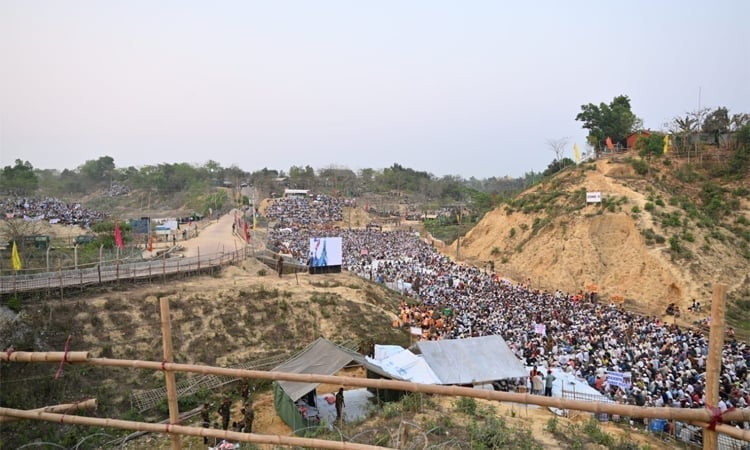News Flash
News Flash

DHAKA, Sept 21, 2025 (BSS)- Speakers at a symposium here today put emphasis on journalists’ broader role to sustain global attention on Rohingya issues.
They said the global attention on the Rohingya crisis is gradually decreasing and journalists need to work to bring the Rohingya issue back on the centre of global discussion through focusing the issue on new perspectives and advocacy.
Senior journalists, diplomats and security analysts gathered here, where more than 40 newsmen from Dhaka and Cox's Bazar took part.
The Press Institute Bangladesh (PIB), Oxfam Bangladesh and Development Media Forum jointly organized a symposium titled “Beyond the Headlines: Rohingya Crisis in New Eyes”.
The speakers said the media should not be limited to reporting on humanitarian aid, the impasse in repatriation or camp-based crime, but should go 'beyond the headlines' and tell the world the full picture of the crisis, so that the international community doesn’t lose their attention from the issue.
The main objective of the event, held ahead of the upcoming high-level meeting of the UN General Assembly, was to highlight the broader aspects of the Rohingya crisis in the international arena.
Taking part in discussion, PIB Director General Faruk Wasif said, Rohingya are not statistics, they are people living with history, culture, struggle for survival and dreams.
“It is the responsibility of journalists to ensure so that their dignity is not lost and their voices are not silenced,” he said.
Rohingya crisis is not only Bangladesh's responsibility, it is a global crisis also, he said, adding “We must keep this story alive until safe and dignified repatriation of the Myanmar citizens takes place”.
Foreign Ministry Secretary and Foreign Services Academy Rector Dr Md Nazrul Islam said what is reported from Dhaka and Cox's Bazar can influence policy-making in New York and Geneva.
“Journalists are not just observers, they are also participants in international discussions on justice, repatriation and accountability,” he noted.
The day-long event also featured three technical sessions attended by Associate Professor Obaidul Haque of Dhaka University and Professor Dr. Bulbul Siddiqui of North South University, Chairman of Osmani Center for Peace and Security Lieutenant General Md Mahfuzur Rahman, Vice Chairman Major General Dr Md Naeem Ashfaq Chowdhury, the Chief Adviser’s Press Secretary Shafiqul Alam, Journalist Khawaja Main Uddin, Diplomatic Correspondent Rahid Ejaz and Reuters Representative Sam Jahan, Oxfam's Head of Influencing Md Shariful Islam, PIB Senior Trainer Golam Murshed, among others.
They said the delay of Rohingya repatriation was reducing the tolerance of the local population and increasing the risk of social and economic instability as the aid was reduced.
The Rohingya crisis can no longer be seen as just a humanitarian crisis; it is also affecting national security, regional stability and diplomatic relations, they said.
In the concluding speech, CA’s Press Secretary Shafiqul Alam said, “Bangladesh has done more than its share. Now it is the responsibility of the international community to take effective measures through funding, accountability and responsibility-sharing.”
He added: “Journalists should maintain accurate and factual reporting and ensure that the voice of the Rohingya reaches the places where decisions are made."
The participants said solution-oriented journalism will draw the attention to the international quarter, create pressure on diplomatic negotiations and hold the parties concerned accountable also.